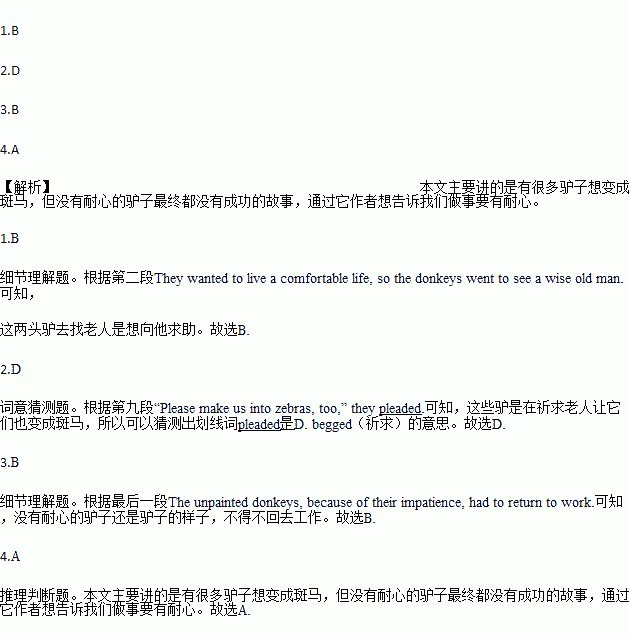题目内容
Long, long ago there were a lot of donkeys. The donkeys worked hard every day. They had no time to play or to relax, but they never felt appreciated (得到赏识的) for the work they did.
One day two donkeys got bored. They wanted to live a comfortable life, so the donkeys went to see a wise old man. They told him their problem. The wise old man agreed they worked too hard, and he wanted to help the donkeys. “I have an idea,” he said.
“What is your idea?” asked the donkeys.
“I will paint you and no one will know y ou are donkeys,” said the man.
ou are donkeys,” said the man.
The man went off to find some paint and he returned in just a matter of minutes. He had two pots of paints. One pot was filled with white paint, and the other black paint.
The old man first painted them white, and then painted stripes(斑纹 ) over the white paint. When he finished, the donkeys did not look like donkeys at all. “You no longer look like donkeys,” the old man said. “Everyone will be fooled (欺骗). I will call you something else, zebras( 斑马).”
The zebras went to a field to eat grass. Now they did not have to work.
Soon, other donkeys saw the zebras. They asked the zebras where they came from. When the zebras told the donkeys their secret, the donkeys all rushed to see the old man.
saw the zebras. They asked the zebras where they came from. When the zebras told the donkeys their secret, the donkeys all rushed to see the old man.
“Please make us into zebras, too,” they pleaded. So the wise old man painted more donkeys. As he did, more and more donkeys came.
The old man could not paint fast enough. Soon the donkeys became impatient(不耐烦的). They began to kick about, and they knocked over the paint pots.
There was no more paint. The painted donkeys ran off to become zebras. The unpainted donkeys, because of their impatience, had to return to work.
1.The two donkeys went to see a wise old man in order to _____.
A. become patient B. ask him for help
C. change into zebras D. have a rest
2.What does the underlined word “pleaded” (in Paragraph9) mean?
A. relaxed B. knocked
C. agreed D. begged
3.What finally happened to the impatient donkeys?
A. They looked for another wise man to paint them
B. They were still donkeys working hard all the time.
C. They won praise for the work they did.
D. They hated the zebras and fought with them
4.What can we infer from the passage?
A. Being patient is very important
B. Both donkeys and zebras had to work hard
C. The wise old man was killed by these impatient donkeys.
D. There is always a good way not to work hard
 名校课堂系列答案
名校课堂系列答案

 . The result is a rise in obesity rates among adolescents. Unfortunately, fixing the problem isn’t as easy as simply cutting down screen time, Janssen cautions. “Decreasing screen time will not automatically increase physical activity levels,” said Janssen, Some active kids also spend a lot of time in front of television and computer screens, and some kids who have low screen times also have low levels of physical activity, he points out.
. The result is a rise in obesity rates among adolescents. Unfortunately, fixing the problem isn’t as easy as simply cutting down screen time, Janssen cautions. “Decreasing screen time will not automatically increase physical activity levels,” said Janssen, Some active kids also spend a lot of time in front of television and computer screens, and some kids who have low screen times also have low levels of physical activity, he points out. n his study instead of putting them______?
n his study instead of putting them______?